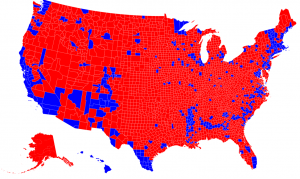Democrats have only had control of the state Senate for a few weeks, and already they’ve voted to give away Colorado’s vote in future presidential elections.
Instead of our nine electoral votes going to the candidate we vote for, the winner of the national popular vote would instead be handed all of Colorado’s votes.
There’s a reason only large or Democratic-controlled states are moving in this direction — Hillary Clinton would be president now under this system.
It gives all the power to elect presidents to heavily populated states, and silences the voice of flyover country overwhelmingly populated by Republicans.
In order for it to take effect, states with at least 270 electoral votes must pass a law — California, New York and New Jersey are already on board.
Republican State Sen. Jerry Sonnenberg of Sterling says this bill would abdicate Colorado’s voice in presidential elections, and he’s right.
“Why would we want to cede any of our power to what the national popular vote says, to what California says, to what New York says?” Sonnenberg said.
Republicans tried to drive home their point by jokingly suggesting language stating Colorado would just be surrendering their vote to California. It would be funnier if it weren’t actually true.
Sponsored by Democratic state Sen. Mike Foote of Lafayette, the bill passed the Senate Monday and will soon be voted on in the House for final passage.
We fully expect Gov. Polis will gleefully sign it into law.


Where when and how will we be protesting?
Senate Bill 042 is a dumb idea. It appears to be a Democratic reaction to losing two elections despite receiving a majority of the popular vote, to wit: Al Gore to George Bush and Hillary Clinton to Donald Trump.
It is a dumb idea for the following reasons:
1. Under this measure, a Coloradan’s vote wouldn’t count at all except as, say one of some 65.8 million (Clinton’s national total). I would much rather be one of 1.3 million (which is the rounded number of what Clinton got in Colorado in 2016).
2. By changing the system as proposed, given the current political alignment, you would never see a Democratic presidential candidate campaign outside the most populous states. Using Clinton as an example:
a. Approximately 35% or so of the registered voters will vote for a Republican or a Democrat, in accordance with their registration, without a candidate ever campaigning in their state for their vote. Thus, with 157.6 million registered voters across the country, Clinton, for example, would have gotten 35% of their votes (55.1 million) without doing anything.
b. Assuming that 65.8 million votes would have won her the election (which is what she got in winning the popular vote), all she would have needed, under the proposed scheme, is another 10.7 million votes.
c. She could have gotten those 10.7 million votes, over and above the 35%, from just 10 states — California, New York, Illinois, New Jersey, Massachusetts, Virginia, Wisconsin, Maryland, Minnesota, and Colorado.
3. Don’t like polarization? Just think what we would have if a candidate had to campaign in no more than 10 states to win a national election.
A better idea, that would make the voter’s vote count for more, is to apportion the Electoral College votes, beyond the two attributable to the senate seats, according to the vote in each congressional district – like Nebraska. This would make each congressional district of equal importance, would make each voter’s vote count the same across the state and would make presidential contenders mount a 435 congressional district campaign. It would also encourage Democrats to nominate a candidate who can appeal to the entire country instead of just the population centers. Wouldn’t everyone be better off if presidential candidates had to earn the voters in, say, Holyoke, just like they have to earn the votes in Denver?
I like the U.S. Constitution just the way it is and I don’t like this attempted subterfuge.